Club of Amsterdam

Presentations
Henny van der Pluijm, Expert author/editor/publisher on technology and venture capital, Venturemedia.nl
![]() Human rights for machines
Human rights for machines
Arjen Kamphuis, Co-founder, CTO, Gendo
![]() The Singularity – Fantasy, threat or opportunity?
The Singularity – Fantasy, threat or opportunity?
According to the Singularity Institute, (technological) singularity is the technological creation of smarter-than-human intelligence. So simple the definition may look like, it signals the end of 5 million year human evolution with the emergence of super intelligence as a result of exponential technological development. Although different technologies are also suggested, artificial intelligence and brain interfaces are thought to be the likely ones that would first match the level of acceleration necessary to provide such an enormous change. With approximately 100 billion neurons, human brain easily surpasses today’s computer forces. However, this does not change the fact that human brain has only tripled its capacity during the entire evolution while the computing benchmarks increase exponentially, doubling every one or two years. This information hypothetically provides us necessary variables to create a timetable for closing the distance of capacity between the human brain and the foreseen technologies. The arrival to such a threshold will create a loop, or an explosion like the big bang some would say (Ray Kurzweil), which, in turn, will make it possible for instance artificial intelligence to improve its own source code, automatically capsizing the superiority of human intelligence as we have known.
Concept by Iclal Akcay
The speakers and topics are:
Frank Theys, philosopher, filmmaker and visual artist
Changed attitudes on ‘human enhancement’ since the turn of the millennium.
Around the turn of the millennium economic changes and concrete technological breakthroughs within the converging technologies (nano, bio, information and cognitive sciences – NBIC) induced a changed attitude on the prospect of improving the human body among the scientific, the political as well as the cultural communities in the West . Together with the replacement of the term ‘transhumanism’ by the more politicaly neutral ‘human enhancement’, the perception moved from fringe sciences to the mainstream scientific and political agenda and from scienfiction to the mainstream, psychological novel.
Yuri van Geest, Head of Emerging Technologies, THNK, the Amsterdam School of Creative Leadership.
Singularity – The Biggest Tech Wave is Here
Which emerging technologies can be identified in the short and long term that will significantly impact you, your organization and the world at large? What are the social, cultural, ethical, economic, political and legal questions and implications of biotechnology, neurotechnology, artificial intelligence, robotics, brain computer interfaces, internet as well as new energy systems and its convergence?
Henny van der Pluijm, Expert author/editor/publisher on technology and venture capital, Venturemedia.nl
Human rights for machines
With machine intelligence developing at a rapid pace in the near future, the day will soon come when machines will be uncontrollable and their behavior incomprehensible. Within a human generation, the biggest bottleneck in their performance will be the lack of autonomy to function without human oversight. Providing machines with rights and duties will be necessary to repair the balance. This way machines will still be working for us instead of we working for them.
Arjen Kamphuis, Co-founder, CTO, Gendo
The Singularity – Fantasy, threat or opportunity?
The technological singularity is an interesting concept from 1993 by mathematician Venor Vinge. Vinge describes the consequences of smarter-than-human systems (computers, improved humans or symbiotic human-machine systems) as leading to an infinite acceleration of intelligence-improvement. It goes like this: “what would a smarter-than-human artificial intelligence do? It might play the stockmarket or be the worlds greatest artist, politician or general. But it might also become the worlds smartest computer-science researcher working on improving artificial intelligence, making a better version of itself. Rinse and repeat and interesting stuff starts to happen. Computer systems are doubling a performance every 18 months under the limited guidance of static human intelligence. With self improvement they could perhaps double in a much, much shorter time-spans. Think 17 minutes. Or less.
The implications of this idea are profound. It has the potential to make most of our problems today irrelevant (material scarcity and mortality might turn out to be easily solvable problems). It may also destroy our entire solar system.
But just as with nuclear fusion there is also the possibility that it won’t happen. We must guard against passivity among smart people who stop solving problems while they are waiting for ‘the rapture of the nerds’.
19:00 – 20:00
Introduction by our Moderator
Peter van Gorsel, Educational Business Developer, University of Amsterdam / UvA/HvA
Part I:
Frank Theys, philosopher, filmmaker and visual artist
Changed attitudes on ‘human enhancement’ since the turn of the millennium.
Yuri van Geest, Head of Emerging Technologies, THNK, the Amsterdam School of Creative Leadership.
Singularity – The Biggest Tech Wave is Here
Henny van der Pluijm, Expert author/editor/publisher on technology and venture capital, Venturemedia.nl
Human rights for machines
Arjen Kamphuis, Co-founder, CTO, Gendo
The Singularity – Fantasy, threat or opportunity?
20:00 – 20:30
Break with snacks & drinks.
20:30 – 21:15
Part II:
Open discussion

Frank Theys
Philosopher, filmmaker and visual artist
Frank Theys (° 1963, Brussels) is a philosopher, filmmaker and visual artist. He lives and works in Brussels and Amsterdam.
His art and film work received several international awards and belong to the collections of a.o. MOMA (New York), SMAK (Ghent), Centre National de la Cinématographie (Paris) and the Museum for the Moving Image (New York). His documentary trilogy Technocalyps on transhumanism generated many debates within the cultural as well as the academic and scientific world.
Frank Theys has taught at the Higher St-Lukas Film School (Brussels) and has been a visiting teacher and lecturer at universities, film and art schools world wide. He currently works as a freelance filmmaker and as a researcher associated with the KUL (Louvain) and the VUB (Brussels). He is also faculty member of the Speaker’s Academy.
www.frank-theys.net
www.technocalyps.com

Yuri van Geest
Head of Emerging Technologies, THNK, the Amsterdam School of Creative Leadership.
Professional innovator, entrepreneur, galactic thinker and blogger. Right now working on the worlds’ first mobile DNA testing services (bionanochips). Background in online, mobile and Singularity (the latter since 5 years now). Alumnus of the Singularity University driven by Ray Kurzweil, Larry Page, Peter Diamandis, NASA and Google. Co-organizer of THNK, the Dutch educational institute for creative leadership of which Singularity is a fundamental building block. Co-Founder of Mobile Monday Amsterdam and TEDx Amsterdam. Founder of Vodafone Mobile Clicks, the largest mobile internet startup competition in the world.
www.thnk.org

Henny van der Pluijm
Expert author/editor/publisher on technology and venture capital, Venturemedia.nl
Henny van der Pluijm is an author and analist with more than 20 years experience as Technology Trendwatcher. Besides producing articles and analyses about technology trends for platforms like AME Research and Automatisering Gids, he is a leading analist of trends in venture capital investing. Henny has thousands of hours of practical experience with software development.
www.venturemedia.nl

Arjen Kamphuis
Co-founder, CTO, Gendo
Arjen is co-founder and Chief Technology Officer of Gendo. He studied Science & Policy at Utrecht University and worked for IBM and Twynstra Gudde as IT-architect, trainer and IT-strategy advisor. Since late 2001 Arjen has been self-employed, advising clients on the strategic impact of new technological developments. He is a certified EDP auditor and information security specialist. As a much sought-after international speaker on technology policy issues he gives over 100 keynote talks every year.
Since 2002 he has been involved in formulating public IT-policy in the area of open standards and opensource for the government and public sector. Arjen advises senior managers and administrators of companies and public institutions, members of parliament and the Dutch Cabinet about the opportunities offered by open standards and opensource software for the European knowledge economy and society as a whole.
Besides information technology Arjen also works on scenarioplanning and strategic assesments of emerging technologies sush as bio- and nanotechnology. With clients he investigates the social, economic and geo-political impact of science and technology.
Arjen’s collumns and article’s can be found on his Gendo blog.
Dutch: www.gendo.nl/blog/arjen
English: www.gendo.nl/blogs/arjen-int

Peter C. van Gorsel
Educational Business Developer, University of Amsterdam / UvA/HvA
Peter van Gorsel spent many years in publishing before becoming Director of the Institute for Media and Information Management at the Hogeschool van Amsterdam. Since October 2010 he started his new assignment as Educational Business Developer, University of Amsterdam / UvA/HvA.
www.uva.nl
| Impressions
|

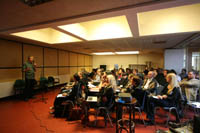
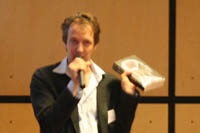
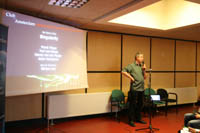
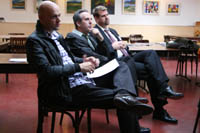
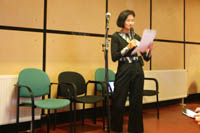
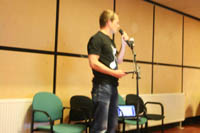
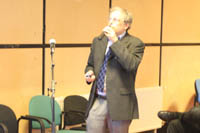
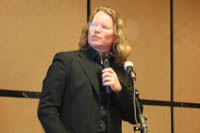
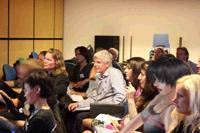
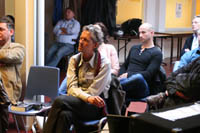
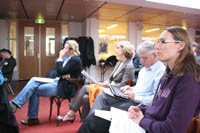
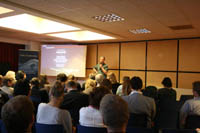
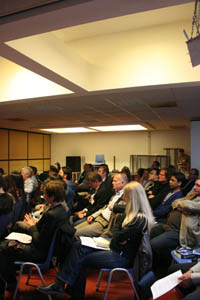
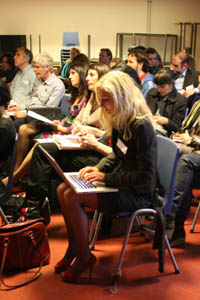

Customer Reviews
Thanks for submitting your comment!